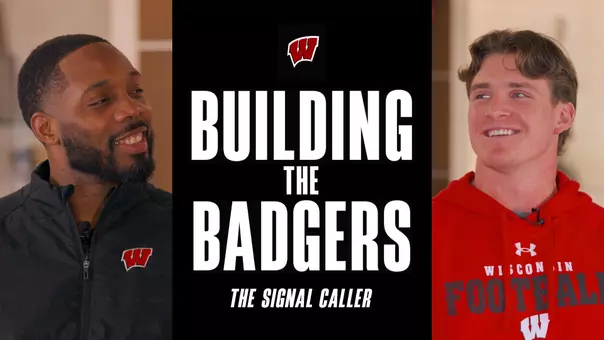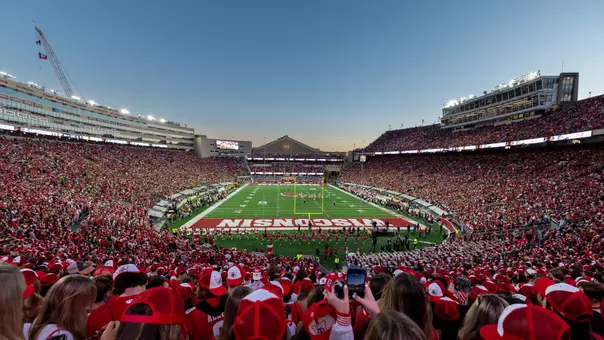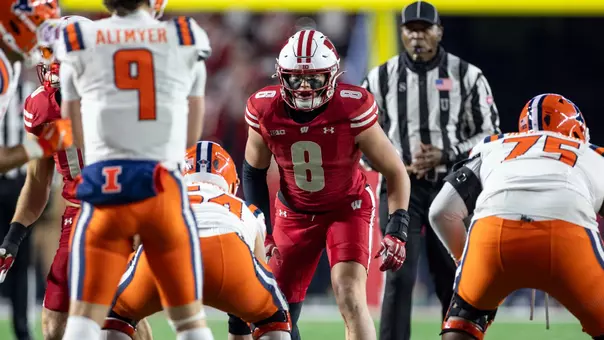Lucas at Large: Bowl offers growth, reward for Leonhard
December 28, 2016 | Football, Mike Lucas
Wisconsin’s secondary coach understands postseason motivations
 |
||
|
BY MIKE LUCAS
UWBadgers.com Senior Writer
MADISON, Wis. — Prior to the 2002 Alamo Bowl, there was never a doubt in Jim Leonhard's mind that he would be able to field his position and punts despite a broken right thumb. But it became more problematic for Wisconsin's All-American free safety when he broke the thumb on his left hand while tackling Colorado running back Chris Brown. Because he didn't want to come out of the game, he kept it to himself.
"I caught the first punt and didn't say anything," Leonhard recounted. "The second one, I ended up muffing the punt. When I came off the field, Cos (defensive coordinator Kevin Cosgrove) was getting after me a little bit and I went, 'Coach, I broke my other thumb.' He stopped yelling at me pretty quick and said, 'Next time, just tell me, and we'll get you out.'"
Upon further review, 14 years later, Leonhard conceded that trying to field punts with a couple of busted thumbs was something "I don't recommend doing." Unless, of course, you've got a heart the size of Texas and the competitive fire of someone like the 5-foot-8 Leonhard, whose tenacity and guile as a former player have shaped his first season on the sideline as Wisconsin's secondary coach.

"I've enjoyed it," said Leonhard, 34, who had no previous coaching experience beyond serving as the quintessential "coach on the field" during a 10-year career in the National Football League. "The group I have is a lot of fun to coach. As far as talent, and playmaking, they have been highly productive.
"But, then, it was just their willingness to be coached and wanting to learn and get better. As a coach, even as a player, that's what it's all about, right? It's an important aspect of it and it doesn't matter where you're at in your development. It's pushing to get better. This group was like that."
Their resiliency came into play after losing 38-31 to Penn State in the Big Ten Championship Game. Not that it was all on the defensive backs, because the Badgers were unable to mount consistent pressure on quarterback Trace McSorely, who threw for 384 yards and four touchdowns. Still, there were uncharacteristic breakdowns in the secondary resulting in five completions of 25 or more yards.
"Obviously that one hurt, it hurt as a group," Leonhard said. "We went into that game extremely confident. We had been playing our best football. To have that happen I think was a little bit shocking to some guys. The game turned in a hurry. For about 28 minutes, we played about as good as you can play. They (the Nittany Lions) didn't have a lot going and then it flipped and it flipped in a hurry."
What are the challenges now?
"Getting the confidence of the group back," he said. "That's the humility you need to play this position. Sometimes that happens (bad results). How do you respond? That's the part you have to learn from. How do you give up one or two of those plays and snap back as a group rather than it going the entire half? That's the hardest part to deal with. You're going to get beat. You're going to give up plays."
But you can't dwell on those plays, he insisted.
"How fast can you let it go and be you?" Leonhard posed.
The answer came prior to the start of the bowl practices. The players were hurting.
"To me, it's important to let it hurt," Leonhard said. "We had huge goals going into the season and they were all right there. When you come that close and let it slip away, it should hurt and it should be more than a day or two that it does. And it did. But I thought our leaders really rallied the team. Once you find out where you're going for your bowl, the guys jump back on board and get after it."

Regardless of the league affiliation — set that aside — the Western Michigan passing attack is a tough draw. Especially the battery of quarterback Zach Terrell and wide receiver Corey Davis. During their career, they have combined for 50 touchdowns; or more than the fabled Texas Tech tandem of Graham Harrell and Michael Crabtree; more than West Virginia's Geno Smith and Stedman Bailey.
The only duo in Football Bowl Subdivision history that has been more prolific in scoring than Terrell and Davis has been Rice's Chase Clement and Jarett Dillard with 51 TDs (2005-08). This season, Terrell has completed 71 percent of his throws for 3,376 yards (259.7) and 32 scores. He has been intercepted just three times. Davis had 91 catches for 1,427 yards (15.7) and 18 touchdowns. He has 5,212 career receiving yards.
"He's extremely talented as far as his size, his speed and the physicality that he plays with," Leonhard said of the 6-3, 213-pound Davis, who has 326 receptions and 51 TDs in 49 career games. "He really does it all and he can play multiple positions, so you don't know where he is going to be from snap to snap. They do a good job of featuring him and then using him to get certain looks."
Leonhard has an appreciation and respect for the mindset that motivates a lot of players in the Mid-American Conference — undersized or underdeveloped high school prospects that may have been snubbed or simply overlooked by the Power Five leagues. As a former Wisconsin walk-on, and later, as an undrafted NFL free agent, Leonhard can relate to what drives them to overcome the odds.
Last week, he scanned the 2017 Pro Bowl rosters and discovered that 13 "no-stars" were named compared to 11 "5-star" recruits. Of those players who had no rating coming out of high school were a couple of MAC products, Ben Roethlisberger (Miami University) and Antonio Brown (Central Michigan). Of the 80 players selected, there were 45 with 3 stars or lower; and 35 with 4 or 5 stars.
The recruiting misses have always piqued Leonhard's curiosity.
"Where was the miss?" he asked "Why did people not see this (in a prospect)?"
Reflecting on his own UW scenario, he concluded, "Sometimes, it's truly developmental."
Consider: As a true freshman, he saw action primarily on special teams and had just 12 tackles. In each of the next three seasons, he started every game and finished with 99, 98 and 72 tackles to go along with 11, 7 and 3 interceptions. He also returned punts — he was the Big Ten's career leader in punt return yardage (1,347) — and was recognized as a three-time All-American; most deservedly so.
Over the years, though, Leonhard has learned to take nothing for granted. Especially bowl trips. "I feel like sometimes players, coaches and fans can get a little bit spoiled," said Leonhard, who knows what it feels like to sit home for the holidays. During his first year on campus (2001), the Badgers went 5-7 and didn't play in a bowl, marking the last time that they failed to earn a postseason invitation.
"It's not a guarantee and it can very easily change," he said, cognizant of the UW's 15 straight bowl appearances. "You see programs every year where they were either at the top or close top (of the national rankings) and a year or two later, nobody is talking about them anymore. Like Coach (Paul) Chryst always says, 'It just doesn't happen. A lot goes into it and the guys take a lot of pride in that.'"
Leonhard doesn't need any convincing. He's fired up for the Cotton Bowl.
"I always thought bowls were great," he said. "You're in a new city, you get to have some new experiences with your teammates, you get a little free time to enjoy that and you cap it off by going out and playing a good football team. It's kind of a treat because the season is such a grind mentally.
"Week to week it goes so fast that you can kind of reflect and take a deep breath. If you do it right, there's a lot of growth that can happen before the bowl. You get to go back and watch some old tape. You get to get healthy if maybe you were dealing with little injury affecting the way you played.
"And, then, you get one more chance to go out there with your group and it means a lot."
That's his rule of thumb, busted or otherwise.













